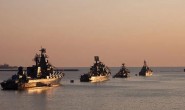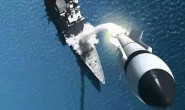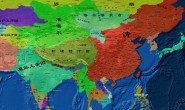The Ural region could form a republic—as it tried to do in 1993—around Yekaterinburg, Russia’s fourth-largest city, or else it could form a union with Siberia. Siberia itself could revive its own identity, from a base in the cities of Krasnoyarsk and Irkutsk, and lay claim to its oil-and-gas riches, which it would sell to China. Unlike Russia, China might not have much interest in territorial expansion into the sparsely populated Far East and Siberia, but it could (and already does) colonise these regions economically. Vladivostok and Khabarovsk, two of the largest cities in the Far East, are more economically integrated with China and South Korea than they are with the European part of Russia.
Things fall apart—with nukes inside
Despite Russia’s deep paranoia that America is trying to break it up, such a scenario is one of the West’s worst nightmares. It opens the question of control over Russia’s nuclear arms. Although the command centre would remain in Moscow, securing missiles spread across Russian territory could be harder than it was after the collapse of the Soviet Union. At the time, the Russians and Americans worked successfully together to move the nuclear arsenal from Ukraine and Kazakhstan to Russia. Ukraine was given a piece of paper—called the Budapest memorandum and signed by Russia, America and Britain—which guaranteed its territorial integrity in exchange for giving up its nuclear arms. Now, Russia’s annexation of Crimea has made any such assurance worthless.
The spectre of disintegration is already haunting Russia. Politicians and pundits are scared to discuss it publicly. Shortly after annexing Crimea and stirring separatism in eastern Ukraine, the Kremlin introduced a law which makes “incitement of any action undermining Russia’s own territorial integrity” a criminal offence. Yet the greatest threat to Russia’s territorial integrity is posed by the Kremlin itself and its policies in Ukraine.
By breaking the post-Soviet borders, Mr Putin opened a Pandora’s box. If Crimea “historically” belongs to Russia as he has claimed, what about Kaliningrad, the former K?nigsberg, an exclave which Germany lost to Russia after the second world war? Should not eastern Karelia, which Finland ceded to the Soviet Union after the winter war in 1940, be Finnish and the Kuril Islands return to Japan?
Even more perilously for Russia’s future, Mr Putin brought into motion forces that thrive on war and nationalism. These are not the forces of imperial expansion—Russia lacks the dynamism, resources and vision that empire-building requires. They are forces of chaos and disorganisation. Eastern Ukraine has turned into a nest of criminals and racketeers. They cannot spread Russian civilisation, but they can spread anarchy.
In short, Russia under Mr Putin is much more fragile than it looks. Vyacheslav Volodin, his deputy chief of staff, recently equated Mr Putin with Russia: “No Putin, no Russia,” he said. It is hard to think of a worse indictment.
via the economist
转载请注明:北纬40° » 普京俄国解体后的版图



